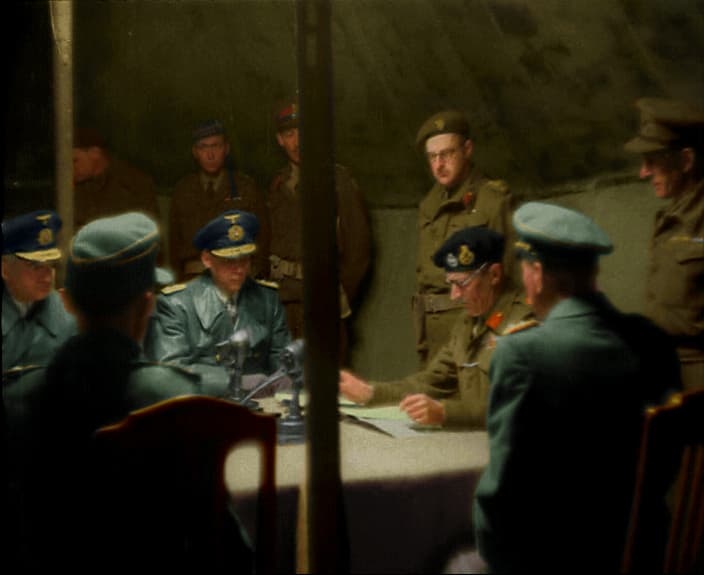The Pittsburgh Press (May 4, 1945)
Capitulation tomorrow includes Holland, Denmark and Reich
LONDON, England (UP) – The German armies of Northwestern Germany, Denmark and Holland have surrendered unconditionally to British Field Marshal Sir Bernard L. Montgomery.
The surrender leaves major Nazi resistance isolated in the two doomed pockets of Norway and Czechoslovakia.
The surrender is effective at 8 a.m. British Time tomorrow (2 a.m. ET).
The Nazi capitulation was announced at the close of a dramatic conference between Marshal Montgomery and a high-ranking but unnamed representative of Grand Adm. Karl Doenitz, the new German Fuehrer.
Marshal Montgomery informed Gen. Dwight D. Eisenhower’s headquarters in Paris that the surrender would also apply to the pocketed German divisions in Heligoland and on the Frisian Islands off the Dutch Coast.
More than 250,000 German troops, representing the last effective German fighting force on the European continent outside Norway and Czechoslovakia, were involved in the mass surrender. Well over 500,000 Nazis laid down their arms on the British front in the last two days.
There were still many minor pockets of resistance on the continent, including areas around a few French ports.
A brief announcement of the northern capitulation, issued at Gen. Eisenhower’s headquarters, emphasized that this was a “battlefield surrender” to Montgomery’s 21st Army Group and not to the Allied governments.
The announcement said:
Field Marshal Montgomery has reported to the Supreme Allied Commander that all enemy forces in Holland, Northwest Germany and Denmark, including Heligoland and the Frisian Islands, have surrendered to the 21st Army Group effective at 8 o’clock tomorrow morning, Double British Summer Time.
This is a battlefield surrender involving the forces now facing the 21st Army Group on the northern and the western flanks.
Serious resistance to the British forces had begun melting away before the announcement of the surrender. United Press war writer Richard D. McMillan reported that German troops were throwing away their weapons by the hundreds of thousands, refusing flatly to fight, and their staff officers, wandering freely through the Allied ranks, admitted it was all over.
The Czechoslovak pocket in the south was rapidly being enveloped and neutralized by U.S. and Russian forces converging on the Austrian city of Linz.
The Nazis said the ceasefire order had sounded in Holland and that British troops were sweeping unopposed through Denmark.
Swedish reports told of spreading mutiny in the German Army barracks at Copenhagen, and the Nazis’ own radio at Wilhelmshaven said the “last hour of the war” had arrived.
Mr. McMillan reported that the entire German High Command had assembled opposite the British forces in the north.
Stockholm said that Doenitz, self-styled Nazi Fuehrer, and his patched-up government were in Denmark – probably somewhere in South Jutland.
The German-controlled Wilhelmshaven radio called on the people for unity “in the last hour of the war.” It said that “to spare further bloodshed and destruction, the high command has taken appropriate measures which can only be carried out in accordance with responsible authorities.” Further orders were on an hour-to-hour basis, it added.
Stockholm and Paris reports told without official confirmation of a dramatic meeting of Marshal Montgomery with Doenitz and other Nazi leaders. Paris said the so-called “peace conference” was at Aabenraa Castle just over the Danish frontier.
The Swedes said Col. Gen. Georg Lindemann, German commander in Denmark, and possibly Dr. Werner Best, German governor in Denmark; Josef Terboven, Reich Commissar in Norway, and Adm. Fritz Boehm, German commander in Norway, attended the reported conference.
Allied transports with food for civilians were going through the German “lines” under some sort of an agreement, the Oslo radio said, and Stockholm reported flatly from Copenhagen that the Germans “no longer control the Danish border.”
A Stockholm dispatch reported the organization of a new Danish cabinet under Premier Wilhelm Buhl.
Malmo reports relayed through Stockholm aid German troops mutinied at Copenhagen barracks yesterday, but the uprising was suppressed. They added that 400 German sailors mutinied in Aabenraa Harbor yesterday and all were jailed.
An Exchange Telegraph dispatch Zurich said Count Ludwig Schwerin von Krosigk, the new German foreign minister, had ousted Dr. Karl Frank, Nazi extremist as governor of Bohemia-Moravia in a move to please the Allies.
The Doenitz government yesterday declared Prague, capital of Bohemia and pre-war Czechoslovakia, a hospital city, an indication that the protectorate may soon capitulate.
